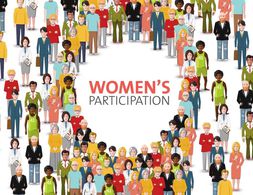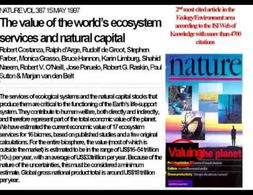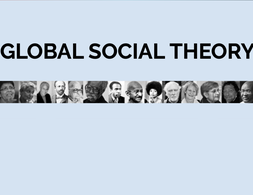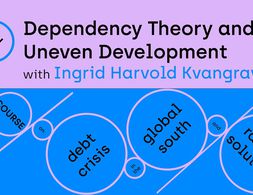✕
353 results
First some terminology is explained. Then the interpretations of the coefficients and constants of the function are discussed. Afterwards the zero conditional mean assumption regarding the residual is problematized. Lastly, a graphical representation of a regression line is given and the least sum of squared errors is introduced and the equation for the coefficient of the linear function as well as for the intercept is given.
As opposed to the conventional over-simplified assumption of self-interested individuals, strong evidence points towards the presence of heterogeneous other-regarding preferences in agents. Incorporating social preferences – specifically, trust and reciprocity - and recognizing the non-constancy of these preferences across individuals can help models better represent the reality.
An essay of the writing workshop on contemporary issues in the field of Nigerian economics: The adverse effect of climate change is overwhelming, not just in Nigeria but globally. Global warming is the result of hostile human activities that have impacted the environment negatively. This is the principal variable the government should tackle through practical innovations such as the acceptable implementation of Adaptation Policies and also through the adequate implementation of environmental tax. These will enhance pro-environmental behaviour which is fit for socio-political and economic activities for sustainability.
Banking 101 is a series of 6 short videos that ask the following questions: How do banks work and how is money created? Is reveals common misunderstandings of money creation and the role of banks. Furthermore, the videos show how models taught in many introductory classes to economics (Econ 101) do not reflect those processes:
Part 1) “Misconceptions around Banking” questions common comprehensions of how banks work (savings = investments).
Part 2) “What's wrong with the money multiplier” states that the model of the money multiplies is inaccurate.
Part 3) “How is money really made by banks” explains the process of money creation, loans and inter-bank settlement.
Part 4) “How much money banks create?” asks what limits the money creation by banks and presents the difference between reserve ratio, liquidity ration, equity and refers to the inter-bank market.
Part 5) Explores the question if banks create money or just credit and especially refers to credit risks.
Part 6) Explains how money gets destroyed when loans are paid back.
Note: The videos refer to the UK monetary and banking system, some explanations don't apply to other banking systems, e.g. the reserve ratio.
The dossier first discusses the impact of colonialism on introducing foreign plants and thus disrupting ecosystems. Subsequently the case of the knotweed, a plant introduced from Japan to the UK and now considered a threat to biodiversity is explored. The complex economy built around the plant consisting of regulations, pesticides, experts, and landowners is then explored.
Irene van Staveren, professor of pluralist development economics, presents her pluralist teaching method for the introductory level. Based on her textbook “Economics After the Crisis: An Introduction to Economics from a Pluralist and Global Perspective” she suggests to focus on real-world problems and pari passu apply economic theories such as Social economics, Institutional economics, Post-Keynesian economics as well as Neoclassical economics without wasting time to single out the latter. Besides pointing out advantages of such a pluralist method Irene illustrates her approach based on interesting topics such as growth or feminist economics.
An essay of the writing workshop on contemporary issues in the field of Nigerian economics: In Nigeria, it appears that there is nothing in the constitution, which excludes the participation of women in politics. Yet, when it comes to actual practice, there is extensive discrimination. The under-representation of women in political participation gained root due to the patriarchal practice inherent in our society, much of which were obvious from pre-colonial era till date.
A central question in development economics literature is, “Why do countries stay poor?” The key disagreements are whether the lack of economic growth stems from institutions or from geography (Nunn 2009). From an institutional perspective, hostile tariff regimes and commodity price dependencies form a barrier to a sectoral shift that would otherwise lead to economic development in developing countries (Blink and Dorton 2011) (Stiglitz 2006).[i]
Here we look at the effect of the 2008 Climate Change Act passed in Parliament in the United Kingdom as an effort to curb emissions in all sectors. The Act aside from setting goals to become a low-carbon economy sets up an independent committee on Climate Change to ensure the implementation of policies to comply with the ultimate goal of 80% reduction in total emissions in 2050. I make use of the Synthetic Control Method (SCM) to create a comparative case study in which the creation of a synthetic UK serves as a counterfactual where the treatment never occurred (Cunningham, 2018).
An Introduction to the Political Theory of John Maynard Keynes. John Maynard Keynes was arguably the greatest economist of the 20th century. He discovered the idea that governments should stimulate demand during economic downturns.
Ricardo Hausmann says the new industrial policy is an information revelation process about the state of possibilities, the nature of the obstacles and figuring out whether you can sort out the obstacles so that these new activities can take over.
This animated video explains gender responsive budgeting and how it is used to mainstream gender in governance planning and budgeting. The video has been pro...
Robert Costanza briefly present various methods of environmental valuation, and talks about the changes in the global value of ecosystem services. He then introduces the major ecosystem services, and how different methods of valuation affect the preferred policies to address environmental issues.
Whether a black swan or a scapegoat, Covid-19 is an extraordinary event. Declared by the WHO as a pandemic, Covid-19 has given birth to the concept of the economic “sudden stop.” We need extraordinary measures to contain it.
This is an overview of (possibly transformative) proposals to address the economic consequences of the corona crisis
The Great Recession 2.0 is unfolding before our very eyes. It is still in its early phase. But dynamics have been set in motion that are not easily stopped, or even slowed. If the virus effect were resolved by early summer—as some politicians wishfully believe—the economic dynamics set in motion would still continue. The US and global economies have been seriously ‘wounded’ and will not recover easily or soon. Those who believe it will be a ‘V-shape’ recovery are deluding themselves. Economists among them should know better but are among the most confused. They only need to look at historical parallels to convince themselves otherwise.
Exploring Economics, an open-source e-learning platform, giving you the opportunity to discover & study a variety of economic theories, topics, and methods.
What is game theory? Game theory is a way of thinking about strategic interactions between people, which makes it a crucial component of economics, political science, international relations, psychology and a variety of other disciplines that deal with the complexities of human interaction in decision making.
In this short Video Silke Helfrich discusses the basics of commons. It’s an introduction into the essence of commons from a perspective stemming from outside the economic discipline that focuses on social practice. Her perception challenges the economic mainstream’s perception of common goods and goes beyond a purely materialistic conceptualisation of commons.
James Robinson gives in this talk a short introduction into the theory and ideas of his popular book "Why Nations Fail" which was published together with D. Acemoglu in 2012. With many real-life examples he gives a lively description on the fundamentals for economic success from an institutionalist view. According to Robinson, the nature of institutions is a crucial factor for economic success. Whether institutions are inclusive (such as in prosperous economies) or extractive (poor economies) stems from the nation's political process and the distribution of political power.
Global Social Theory is a large wiki-like project by Gurminder K Bhambra. Its central aim is decolonising and diversifying universities, production of knowledge, and social thought in general.
It represents a large online library divided into three parts: concepts, thinkers, and topics in/of social theory and decolonial thought. Every part comprises of short, introductory articles on an according theme. It may be helpful to give you a general overview (and a list of basic readings) on the most essential areas of social theory: caste, class, and race; civil society; racism; secularism; feminism and many others.
It may also allow students whose university curriculum in sociology, economics, or other social sciences lacks diversity to compensate for that.
The core of Georgism is a policy known as the Land Value Tax (LVT), a policy which Georgists claim will solve many of society and the economy’s ills. Georgism is an interesting school of thought because it has the twin properties that (1) despite a cult following, few people in either mainstream or (non-Georgist) heterodox economics pay it much heed; (2) despite not paying it much heed, both mainstream and heterodox economists largely tend to agree with Georgists. I will focus on the potential benefits Georgists argue an LVT will bring and see if they are borne out empirically. But I will begin by giving a nod to the compelling theoretical and ethical dimensions of George’s analysis, which are impossible to ignore.
How countries achieve long-term GDP growth is up there with the most important topics in economics. As Nobel Laureate Robert Lucas put it “the consequences for human welfare involved in questions like these are simply staggering: once one starts to think about them, it is hard to think about anything else.” Ricardo Hausmann et al take a refreshing approach to this question in their Atlas of Economic Complexity. They argue a country’s growth depends on the complexity of its economy: it must have a diverse economy which produces a wide variety of products, including ones that cannot be produced much elsewhere. The Atlas goes into detail on exactly what complexity means, how it fits the data, and what this implies for development. Below I will offer a summary of their arguments, including some cool data visualisations.
Happiness economics is a branch in behavioral economics, where it explores the economics factors and consequences of happy humans. What makes people happier, and what benefits do we get when people are happier? This dossier introduces you to the field of happiness economics, from a review of economic factors proposed to influence people’s happiness, to a discussion of the economic consequences of happiness, and concludes with economic policy implications of happiness economics.
Nathan Tankus created this series to introduce people outside of the inner financial circles of professionals, journalists and policymakers to the basic mechanisms and dynamics of monetary policy.
This lecture of the anthropologist David Graeber gives a brief introduction to the thoughts of his 2011 published book Debt: The First 5000 Years.
A detailed introduction into dependency theory that rethinks its relevance to modern development challenges.
Feminist economics is a key component of the movement for pluralism in economics and one that has, to some extent, been acknowledged by the mainstream of the profession. It seeks to highlight issues which affect women because (it claims) they have not traditionally been recognised in a field dominated by men. On top of this, it seeks to carve out a space for women in the discipline, both for intrinsic reasons of fairness and diversity and because it means that women’s issues are more likely to be highlighted going forward.
What influence do changes in tax policy or state decisions on expenditure have on economic growth? For decades, this question has been controversially debated.
Exploring Economics, an open-source e-learning platform, giving you the opportunity to discover & study a variety of economic theories, topics, and methods.
An essay of the writing workshop on Nigeria’s Readiness for and the Effect of the Fourth Industrial Revolution
Since the 1980s, the financial sector and its role have increased significantly. This development is often referred to as financialization. Authors working in the heterodox tradition have raised the question whether the changing role of finance manifests a new era in the history of capitalism. The present article first provides some general discussion on the term financialization and presents some stylized facts which highlight the rise of finance. Then, it proceeds by briefly reviewing the main arguments in the Marxian framework that proposedly lead to crisis. Next, two schools of thought in the Marxian tradition are reviewed which consider financialization as the latest stage of capitalism. They highlight the contradictions imposed by financialization that disrupt the growth process and also stress the fragilities imposed by the new growth regime. The two approaches introduced here are the Social Structure of Accumulation Theory and Monthly Review School. The subsequent part proceeds with the Post-Keynesian theory, first introducing potential destabilizing factors before discussing financialization and the finance-led growth regime. The last section provides a comparative summary. While the basic narrative in all approaches considered here is quite similar, major differences stem from the relationship between neoliberalism and financialization and, moreover, from the question of whether financialization can be considered cause or effect.
We use cookies on our website. Click on Accept to help us to make Exploring Economics constantly better!
































